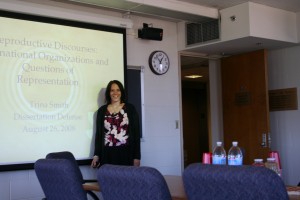I wrote this post during the beginning of my second year in a Masters in Social Work (MSW) program (2012-13 academic year). Reading it now, I think I must have written it before I had interviewed and accepted my current job as an assistant professor, both of which happened in November 2012. I started my new job in fall 2013. The position I was hired for sought someone with a PhD in Sociology and a MSW, which I achieved, but not by taking a “normal” path.
I share my story here on Feminist Reflections to empathize with the struggles of graduate students and post-PhD adjuncts who are trying to find a job, most likely on an academic tenure track. Know that it took me two degrees and five years post-PhD in Sociology to find my fit in an academic institution. I also share this writing because I believe that in our academic field we tend to tie “success” to obtaining the much-coveted tenure track position. In reality, should this be a scholar’s only “measure” of success? Can we support and encourage a feminist sociological perspective beyond the traditional academic job?

I am a feminist sociologist, post-PhD, who is an instructor and a student.
I stared a draft of this article in a much better state of mind than when I first wrote it. Initially I wanted to make a proclamation that feminist sociologists should look back to our history with social work and to the people, such as Jane Addams, that both fields lay claim to. Yet my mood is buffered. I have experienced the difficulty of having a PhD tied to my name, and going back to school, and understanding the historical roots of the professionalization of social work into the clinical field it has become, a competitive endeavor. Alas, my point of this writing has changed from acknowledging the attributes of social work to public feminist sociology, to a more complex one of how we as feminist scholars can support each others’ professionalization in a time of insecurity in higher education and in applied work.
As a feminist scholar, I feel that I should be proud that I have earned a PhD. Anyone with a PhD is part of a very small fraction of the population.

Despite this exclusivity, graduate school socialization tells me that I still haven’t “made it.” I didn’t land that tenure track job I was supposed to get. For the past 3 1/2 years, I traveled from visiting scholar / assistant professor to unemployed, to contract market researcher, to applied work in a business school, to adjunct instructor at a community college. The latter remains my primary work. But my stint in business school along with the still troubled economy, poor academic job market, need for stability in my life, and desire to be a positive role model to my children fueled my decision to go back to graduate school to obtain a MSW.
What’s life like as a MSW student with a PhD?
Difficult. I hear that I am doing things backwards. Apparently, the trend is to get a MSW, work in the field, burn out, and then get a PhD. I also feel stuck between in how I talk about my education and advanced degree. To omit my PhD on a resume would make it look I was quite unproductive for eight years of graduate school. But to list my PhD opens me up to unseemly questions about why the change, or being overqualified, or about why I should instead be placed into internships where my PhD would be an asset. But these options would not provide the learning opportunities to gain what I need in the field.
And there are times, understandably so, when it is not appropriate for me to claim my “title.” But let me back up and explain.
A MSW program is qualitatively different than a PhD program in sociology (or even Master’s degree in Sociology, unless it is applied). First, it has two years of coursework, starting with foundational areas from the history of the welfare state, policy/macro social work, human behavior and the social environment, research methods, and social work methods with individuals, groups, and families. Then one moves on to focus either on community or direct practice. But with each year, an internship is required (taking 16-20 hours a week). The internship for the second year is supposed to be the most important for career placement. But yet in a large metro area with at least three schools with MSW programs, things get very competitive.
Second, a new curriculum change means that one now does not just pick direct practice but chooses among the options of clinical mental health, children and families, and disabilities, health, and aging, with the other option of community practice. While as a young college student, I never knew a MSW could lead to working as a therapist. As with my Bachelor’s degree in sociology and psychology, I thought one must go on to a post-secondary degree in psychology to work as a therapist. In my heart and based on personal experience, I believe MSW’s who obtain the licensure of Licensed Independent Clinical Social Worker make great therapists. They start where the client is at, examine the personal and environmental contexts, and advocate for a person’s self-determination and also social justice, while bounded by the ethics of the National Association of Social Workers.
I have spent much time talking about the requirements of the program, but again, like when I finished my PhD in sociology, fear about future job stability grips me and I retreat to a state of fear. To alleviate this fear, I remember that as a “non-traditional” student, my time is limited to find my dreams and a stable job to support my family while doing something I enjoy. Where does one fit sociology into this? How do I reconcile my structural understandings of the world with working with people in their everyday situations? Why don’t I just decide to work for a non-profit with my MSW and pretend I don’t have a PhD in sociology and eight years of teaching experience? Because, as a feminist, I also have to be true to myself and my own desires. I am 34 years old, and I need a career that supports a family, not just me.

I searched for a mentor, but this has not been easy. I think to myself, “I can’t be the only one who took this path!” I know I am not. I know one other person, but she chose not to speak about her degree and moved out of state to attend school. I talked to my previous sociology professors, who support me. I feel like their colleague. But I have few professors in the Social Work program who believe in me. The irony of a MSW program in a PhD granting R1 institution is that professors do not have much time for mentoring as they work on their publications. And as a MSW student, I feel less important because the time spent with me is not contributing to their tenure portfolios. I reach out to fellow students, the ones with children and jobs who understand the stress of parenting, working, and studying. It is not enough. It just is.
Throughout this process, I learned that I have to believe in myself and make use of the skills I have. I am a passionate instructor. I am a trained sociologist. I am an excellent student. I am an empathetic person. I am not a young 22-year-old student in graduate school for the first time. I don’t have the time to wander and find myself. I need a career. I need some sort of stability. I have to fight the insecurities that became ingrained in me during my first graduate school experience and the pains of the job market after I graduated when I found myself feeling inadequate and realizing that my desire to learn was not enough. I embrace who I am and accept these challenges as growth points. But like others, sometimes I wish the path had been smoother. I have to learn to forgive myself; seek a mentor and support.
I leave you with a question: How can we as feminist sociologists support each other in holding onto our sociological selves, while also searching, and learning about new possibilities, while perhaps even changing careers and trying to manage the real-world effects of a recession? I’d love to hear your thoughts.


Comments 2
Gayle Sulik — November 21, 2014
I love that you shared this personal side of the "becoming an academic" story. I imagine many of us have had crooked paths and/or stumbled over bumps in the road. I know I have. I love that you embrace and accept these challenges as growth points. I too see value in that. If I knew then what I know now, how might things have been different? Would it have been easier, or at least less devastating at times? Graduate school was a real challenge. I was the first person in the history of my family, ever, to take that route so it seemed quite foreign. But I loved learning, being persistent, and proving I could do it. To myself, my committee, my peers, my discipline. So, now what? Here we are. We made it, perhaps with different definitions of success than we ever anticipated or were socialized into believing in. But we made it. I congratulate you. And I also honor those who decided at some point during the process to OPT OUT. That's also a reasonable and valuable choice. Thank you for your honesty and setting the stage for opening up to more truth-telling in the Academy and beyond. -- gs
Mindy — November 21, 2014
Thanks for this open and thoughtful post, Trina. As someone with both of the degrees you have, I find it especially fascinating to hear your story. You bring a level of insight that combines practice and theory. I went after my MSW as a 20-something who was a bit lost. I had been a social work major in college, and my university had a 1-year MSW program. So that's what I did, and I got the degree in 1975. It opened a lot of doors, and none of them were traditional social work jobs! But having a Master's degree mattered. When I talk with more recent graduates of MSW programs, I am envious when I hear about programs that really grappled with social problems, but not from a traditional "let's help those people" mentality (which was characteristic of my program). What an interesting dilemma you have faced in pursuing this practice-based education but being perceived as overqualified, etc. - and yet as you discuss it, it's clear that you brought your sociological eye to understanding the broader questions about the issues your program grappled with, as well as at a meta-level, about the social work education you were experiencing, how it is taught and how it is viewed within the academy and more broadly. I believe that the combination of academic and practice degrees are complementary, and I'm sure that many settings would benefit from your knowledge. You seem to have landed in a position you wanted, and they're lucky to have you. MF